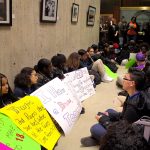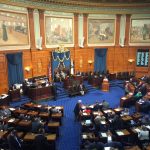
Former Boston Grand Prix CEO John Casey has hit the City of Boston with a $15.5 million dollar lawsuit, claiming willful negligence on the City’s part led to the failed launch of the 2016 IndyCar race.
The race was slated to take place on Labor Day weekend of last year in Boston’s Seaport District, but the project was never completed.
In his official complaint filed at the Suffolk County Superior Court on Sept. 12, Casey accused Austin Blackmon, the City’s chief of environment, energy and open space, of withholding information regarding changes in the FEMA Flood Map which led to the abrupt cancellation of the race.
The complaint states Blockman is “singularly responsible” for the “loss of reputation, diminished health, loss of business, and several millions in damages,” Casey faced after the cancellation.
The complaint stated Blackmon was alerted of the Flood Map changes in September of 2015, but failed to notify the Boston Grand Prix nor any colleagues at Boston City Hall until six months later, in March of 2016.
“His negligence was responsible for millions of taxpayer monies to be wasted in addition to millions of Boston Grand Prix monies to be wasted,” the complaint stated.
Casey blames Blackmon and Boston Mayor Martin Walsh for tarnishing his reputation through their obstructions to his IndyCar race, according to the complaint.
“If Blackmon acted appropriately and notified Boston Grand Prix and Stakeholders when he became aware, the race event would have taken place and no damage would have occurred,” the complaint stated.
The complaint alleges Walsh made the race impossible by not honoring his pledge to allow the Boston Grand Prix to use the Boston Convention Center parking lot when the original permit deal fell through. The City of Boston backed out on its promises to cover street renovation costs and host the IndyCar race for five years, agreeing only to a one-time event, according to the complaint.
The Mayor’s Press Office refused to comment as this case is under ongoing litigation.
Maureen O’Rourke, the dean of the Boston University School of Law, said a civil case of this nature is incomplete without all the facts present and therefore seemingly bias without information from the City.
“The case is messy because it is very fact dependent and we have only one version of the facts at this point,” O’Rourke said. “I wouldn’t want to opine on the outcome because to make an educated assessment, you have to hear the facts from both sides. The complaint by its very nature contains only the plaintiff’s version of events.”
O’Rourke said it is difficult for the plaintiff to prove elements of negligence in cases like this that deal with contract claims of hearsay.
Several Boston residents expressed concern regarding the City’s financial stability and reputation if it were to lose the case and $15.5 million as a result.
Mary Lou Seidner, 50, of Downtown Crossing, said she could imagine a horrible financial outcome if the City of Boston were to lose the lawsuit.
“Every time we have a bad snow storm, we run out of money for snow removal, so I can’t begin to imagine what kind of negative impact a loss like that would have on the city,” Seidner said.
Michael Fogaren, 27, of the North End, said he remembered watching the preparation for the 2016 Indy Car race across the street from his work and found it puzzling when the race was suddenly canceled.
Fogaren said he felt concerned about where money might be subtracted from to pay off a $15.5 million lawsuit.
“It would be sad if it took away from other programs that Boston could use the money for but I think the city should’ve given the Grand Prix more of a warning in advance of any changes they were making,” Fogaren said.
Caitlin Gorman, 28, of South Boston, said she remembers feeling skeptical of the possibility of an IndyCar Race at the Seaport but now she fears for her city’s reputation if the government were to lose the case.
“When I heard about the race being planned at the seaport, I kind of wondered how that was ever going to work,” Gorman said. “I don’t think it ever really made sense from the beginning but if the city agrees to do something and backs out, I think that looks really bad on our part.”




